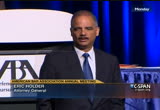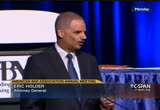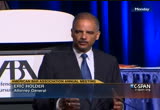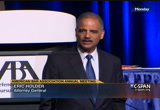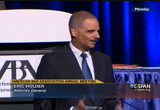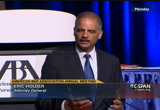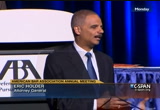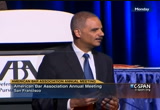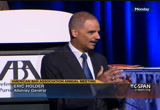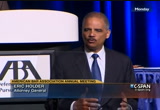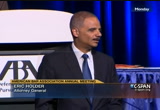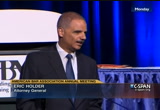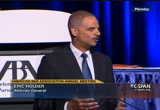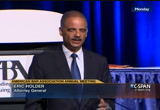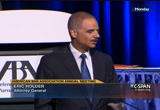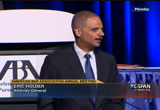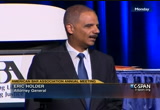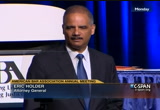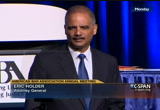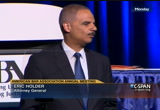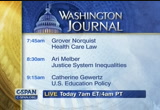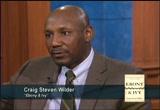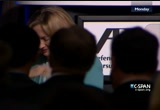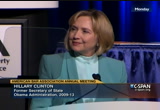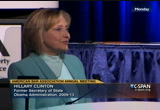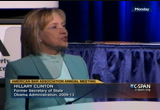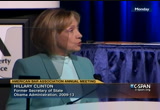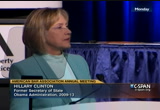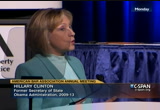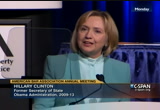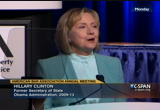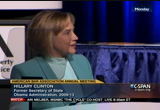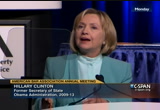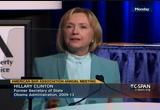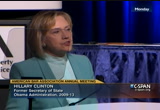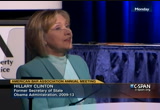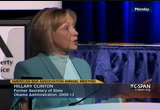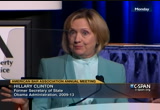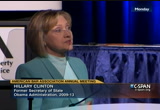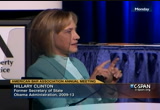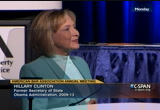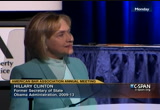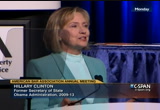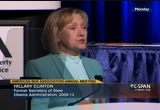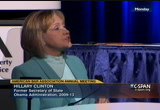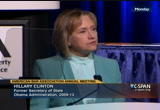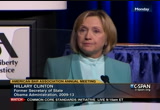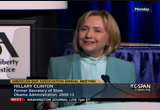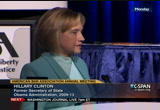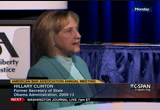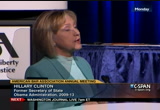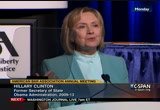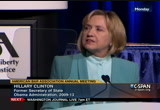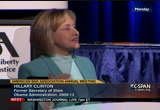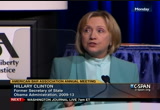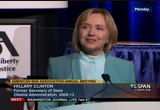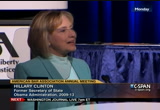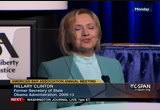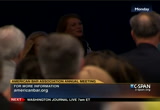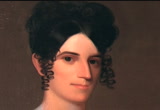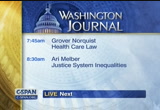tv First Ladies Influence Image CSPAN August 13, 2013 6:00am-7:01am EDT
6:00 am
prevention, we're rallying federal leaders, state officials, private organizations, and community groups to better understand, address, and prevent young people's exposure to violence. we have assembled a new task force to respond to the exstream levels of violence faced by far too many american indian and alaska native children. next month we will launch a national public awareness campaign to call for comprehensive solutions. and through the department of civil rights division and other components we will continue to work with allies like the department of education and throughout the federal government and beyond to confront school- to-prison pipeline and those zero-tolerance school policies that do not promote safety and that transform too many educational institution frs doorways of opportunity into gateways of the criminal justice system.
6:01 am
a minor school disciplinary offense should put a student in the principal's office, and not a police precinct. [applause] we'll also continue offering resources and support survivors of sexual assault, domestic violence, and dating violence. earlier this summer, i announce a new justice department initiative, known as vision 21, which offers an unprecedented snapshot of the current state of victim services. it calls for sweeping evidence- based changes to bring these services into the 21st century and to empower all survivors by closing research gaps and developing new ways to reach those who need our assistance the most.
6:02 am
this work shows tremendous promise. more broadly, through the department's access to the justice initiative -- julls initiative, the civil rights decision and range of grant programs, this administration is bringing stakeholders together and providing direct support to address the inequalities that unfold every day in american courtrooms to fulfill the supreme court's historic decision in gideo vs. wainwright. 50 years ago last march, this landmark ruling afirmed that every defendant charged with a serious crime has the right to an attorney, even if he or she cannot afford wufpblet yet america's indigent defense systems continue to exist in a state of crisis and the promise of gideon is not being met. [applause]
6:03 am
to address this crisis, congress must not only end the forced budget cuts that have decimated public defenders nationwide, they must expand existing indigent defense programs, provide access to council for more juvenile defendants, and increase funding for federal public defender offices. [applause] and every legal professional must answer the a.b.a.'s call to contribute to this cause through pro bono service and help realize the promise of equal justice for all. [applause] as we come together this morning, this same promise must lead us all to acknowledge that although incarceration that is has a significant role to play in our justice system, widespread
6:04 am
incarceration at the federal, state, and local levels is both ineffective and unsustainable. it imposes a significant economic burden, totaling $80 billion in 2010 alone, and it comes human and moral costs that are impossible to calculate. as a nation, we are goled coldly efficient in our incarceration efforts. now, while the entire u.s. population has increased by about a third since 1980, the federal prison population has grown by an astonishing rate, almost 800 percent. it is still growing, despite the fact that federal prisons are operating at nearly 40% above capacity. countryugh this comprises just 5% of the world's population, we incarcerate almost a quarter of the world's prisoners. more than 219,000 federal inmates are currently behind bars. almost half of them are serving time for drug-related crimes and many have substance use disorders.
6:05 am
9 million to 10 million more people cycle through america's local jails each year. roughly 40% of former federal prisoners, and more than 60% of former state prisoners, are rearrested or have their supervision revoked within three years after their release, at great cost to american taxpayers and often for technical or minor violations of the terms of their release. as a society we pay a too high price whenever our system fails to deliver outcomes that deter and punish crime, keep us safe, and enshoor that those who pay their debts have the chance to become productive citizens. right now unwarranted disparities are far too bhon common. president obama said last month, it is time to ask tough questions about how we can strengthen our communities, how we can support young people. how we can address the fact that young black and lat mow men are disproportionately likely to become involved in our
6:06 am
criminal justice system as victims as well as perpetrators. we also must confront the reality that once they are in that system, people of color often face harsher punishments than their peers. one deeply troubling report released in february of this year indicates that in recent years black male offenders have received sentences nearly 20% longer than those imposed on white males convicted of similar crimes. this isn't just unacceptable, it is shameful. [applause] it is unworthy of our great country. it is unworthy of our great legal tradition. and in response i have today directed a group of u.s. attorneys to address sentencing disparities and to develop
6:07 am
recommendations on how we can can address this. in this area and in many others, in ways both large and small, we as a country must re-- resolve to do better. the president and i agree that it is time to take i pragmatic approach. that's why i am proud to announce today that the justice department will take a series of significant actions to recalibrate america's federal criminal justice system. we will start by fundamentally rethinking the notion of mandatory minimum sentences for drug-related crimes. [applause] some statutes that mandate inflectionible sentences, and this is regardless of the individual conduct at issue in a particular case, reduce the discretion available to prosecutors, judges, and juries.
6:08 am
because they oftentimes generate unfairly long sentences, they breed disrespect for the system. when applied indiscriminately, they do not serve public safety. they -- let's be honest -- fill the enforcement priority that we have set, have a destablizing effect on particular communities. largely poor and of color. and applied inappropriately, they are ultimately counter productive. this is why i have today mandated the modification of the justice department's charging policies so that certain low-level, nonviolent drug offenders who have no ties to large-scale organizations, gangs, or cartels will no longer be charged with offenses that impose draconian mandatory minimum sentences. [applause]
6:09 am
they now will be charged with offenses for which the acome anying sentences are better suited to their individual conduct, rather than excessive prison terms more appropriate for violent criminals or drug kingpins. by reserving the most severe penalties for serious, high- level, or violent drug traffickers, we can better promote public safety and drug rehabilitation while making expenditures smarter and more productive. we have seen this approach that is bipartisan support in congress. a number of senators including durbin, leahy, lee, and paul have introduced promising legislation aimed at giving federal judges more discretion in applying mandatory minute mums in certain drug cases. the president and i look forward to working with members of both parties to refine and advance these proposals. secondly, the department has now updated its frame work for considering compam compassionate release for inmates facing extraordinary or compelling circumstances and who pose no threat to the public. in late april, the bureau of prisons expanded the criteria which will be considered for inmates seeking compassionate release for medical reasons. today i can announce fission additional expanses to our policy, including revised criteria for elderly inmates who did not commit violent crimes and sho
6:10 am
6:11 am
share best practices for enhancing the use of diversion programs such as drug treatment and community service initiatives that can serve as effective alternatives to incarceration. our u.s. attorneys are leading the way in this regard, working along side the judiciary to meet safety impair tiffs while avoiding incarceration in certain cases. in south dakota a joint federal tribal program has helped to prevent at-risk young people from getting involved in the federal prison system. thereby improving lives, saving taxpayer resources, and keeping communities safer. this is exactly the kind kind of proven innovation that our federal policymakers and state and tribal leaders should emulate. that is why the justice department is working through a program called the justice reinvestment initiative to bring state leaders, local stakeholders, private marns, and federal officials together to comprehensively reform corrections and criminal justice practices. in recent years no fewer than 17 states, supported by the department and led by governors and legislators of both parties, have directed funding
6:12 am
away from prison construction and toward evidence-based programs and services, like treatment and supervision that are designed to reduce recidivism. in kentucky new legislation has reserved prison beds for the most serious offenders. as a result, the state is projected to reduce its prison population by more than 3,000 over the next 10 years, saving more than $40400 million. in texas investments in drug treatment for nonvie leant leapt offenders and changes to parole policies brought about a reduction in the prison population of more than r5,000 inmates last year alone. in the same year, similar efforts helped arkansas reduce its prison population by more than 1,400. from georgia, north carolina, and ohio to pennsylvania, hawaii and far beyond reinvestment and serious reform are improving public safety and saving precious resources. let me be clear, these measures
6:13 am
have not compromised public safety. clearly, these measures can work. it is time for others to take notice. 6 [applause] my policies and i will continue to work. the a.b.a. has catalogued tens of thousands of statutes that impose unwise and counterproductive clathclats radical consequences on people who have been convicted of crimes. i've asked state attorneys general and a variety of federal leaders to review their own agencies' regulations. today i can announce that i've directed all the department of justice components going forward to consider whether any proposed regulation or guidance may improse unnecessary collateral consequences on those seeking to rejoin their communities. [applause] the bottom line is that while the aggressive enforcement of federal criminal statutes remains necessary, we cannot simply prosecute or incarcerate our way to becoming a safer nation. to be effective, federal efforts must wls pokeous on prevention and re-entry. we must never stop being tough on crime. we must also be smart and efficient when battling crime and the conditions and the individual choices that breed it. ultimately, this is about much more than fairness, it is a matter of public safety and public good. it makes plain economic sense. it is about who we are as a people, and it has the pow -- it has the potential to positively impact the lives of every man,
6:14 am
woman, and child in every city and neighborhood in the united states. after wall u all, whenever recidivism crime is committed, communities are victimized, burdens are increased, and depleted resources are depleted further. today and together we must declare that we will no longer set my colleagues and i will keep working closely in groups like the american bar association to extend these efforts. in recent years, with the department support, we have catalogued tens of thousands of statutes and regulations that impose unwise and counterproductive collateral consequences. when people who have been convicted of crimes. i have asked the attorneys general and a variety of federal leaders to review their own agency regulations. the this is our chance, to bring every community justice is done.
6:15 am
for more than two decades, the we've always held dear, if we prosecutesbut determined to make the or incarcerate our way to the nation. me. [applause] federal efforts must focus on prevention and reentry. we must never stop being tough on crime, but we must also be smart and deficient in battling crime and the conditions and the individual choices that breed it. ultimately, this is about much more than fairness for those that are released from prison, it is a matter of public safety and public good. it makes plain economic sense. it is about who we are as a people, and it has the potential to positively impact every life of every man, woman, child of every neighborhood in city of the united states. after all, whenever of recidivist crime is committed,
6:16 am
communities are less safe. already strained resources are depleted even further. must and together we declare we will no longer settle for such an unjust and unsustainable status quo. to do so would be to betray our history, our shared commitment to justice and the founding principles of our nation. instead, we must recommit ourselves as a country to tackling the most difficult questions in the most costly problems, no matter how complex or retractable they may appear. we must pledge as legal professionals to lend our talent, training and rivers perspective to his fans and the critical work and must resolve as a people to take a firm stand against violence, against victimization, against inequality and for justice. this is our chance to bring
6:17 am
america's criminal-justice system in line with our most sacred values. this is our opportunity to define this time from our time as one of progress and innovation. this is our promise to forge a more just society, and this is our solemn all of cape -- obligation as servants of those who make the powers about the need to reform our broken system. to fight with the sweeping system of changes we needed to uphold the dearest values. by calling on peers and values to not only win the case, but to ensure in every case, in every circumstance, and in every community, justice is done. this is the cause that has been a common pursuit for more than two centuries. will drivel that
6:18 am
additional actions by president obama and leaders throughout his administration in the months ahead. we recognized that the reforms i have announced today and others we must explore and implement, these will not take hold overnight. there will be set back and false starts. we will encounter resistance from opposition, but if we keep facing one another and in the principles we have always held dear, if we stay true to history as a driver of positive change, and if we keep moving forward together knowing the need for the work will outlast us and determined to make the difference we see, that i know we can all be confident in where the efforts will lead us. i look forward to everything that will move -- that we will undoubtedly achieve and always be proud to stand beside you in building the more just, brighter, and more prosperous
6:19 am
future that all of our citizens deserve it. thank you all so much for having me. [applause] a small-town tried to cancel >> grover norquist discusses his group's efforts to repeal the health-care law for one year. m.s. the end -- and then -- nbc host looks that inequality in the criminal justice system. after that the assistant editor of education week talks about ae
6:20 am
and how it plays into the overall education policy in the u.s., plus or e-mails, phone calls, and weeks. -- tweets. the things i looked at as i was exploring this, i looked at a lot of the county .ecords when you look at the colonial county records, very often you will have the name of the president or professor and then it listed with the taxable property will be an enslaved person or two or three. bring slaves?s >> yes. if you look at the name of the president and then three lines over, the taxable property is an enslaved person. is theu will often have president's name did go to
6:21 am
college. who owns the person? in a common knowledge of the town of the local area, the president and the college are inseparable anyway. >> christie and wilder and in effect -- and the connection of a league universities in the past of the enslaved people. [applause] aboutlary clinton spoke voting rights at the american bar association annual meeting. she talked about the supreme court's decision to vote down part of the voting rights act. the former secretary of state al,o received the ava med the highest honor for service. this is 35 and its. >> bank here. thank you very much.
6:22 am
-- thank you. thank you all very very much. thank you. think you very much, president bellows of. thank you, mr. chairman, members of the house of delicate, incoming president, friends and colleagues, long time and members of the ava, i am so deeply grateful to you for this award. by those whoed have received it in the past to join their company, in some small measure to continue the work championed.
6:23 am
i know earlier you heard from attorney general holder about important issues in our criminal justice system. afternoon i want to raise another such issue, voting rights. the ava has where been particularly active all my professional life and to share perspective from four decades as a lawyer, diplomat about white voting rights are sold foundational to our democracy and future. to underscore that this honor from the american bar association means so much to me because i know the work that the amba does. 25has been hard to believe years ago has -- 25 years has
6:24 am
passed since i got the call suggesting to chair it the women in the profession. he was very persuasive. we held a hearing after hearing recording the experiences of women lawyers, judges and professors. in fact, a number of my colleagues from the first commission are here with us this afternoon. no one ever suggested we hold back, go slow, avoid the hard truths. aba started the movement for gender equality in the profession and continues to be at the forefront today with initiatives to ensure equal work really does mean equal pay. i want to applaud the leadership in combating human trafficking at home and abroad, and so many other issues where america's lawyers can and should lead the way. i am well aware that some
6:25 am
people see lawyers as part of the problem in our society, but i learned very early on that lawyers are often essential to the solution to any problem we face. as secretary of state, i saw the contributions the aba makes around the world. your role a lot of initiative is hoping to improve governance, deliver justice and promote human rights in more than 60 countries. a few years ago i had the chance to visit members of the women's bar association, who were fighting domestic violence, child marriage and other abuses in a country without a strong tradition of the rule of law or a vibrant civil society, the aba's support made an enormous difference to the women.
6:26 am
the world just as project, launched by the formal -- former president has developed rule of law and decks, which i found very helpful. it measures governments around the world based on for universal principles. first, but government, people, and corporations should all be accountable under the law. second, that laws must be clear, publicize, stable, and just. andd, that laws are enacted enforced fairly and efficiently, and forth, it covers confidence and independent lawyers and judges deliver justice under the law. these are essential concepts for any healthy democracy, including it is also about how
6:27 am
wall serve society. i mean this in at least two ways. first, that law can be an instrument for improving people's lives, in addition to adjudicating disputes in shaping the government. second, that the law belongs to the people. that its power flows from their consent and participation. this is about making a lot real and vibrant, as opposed to parents and abstract. about insuring that well below wall should never -- never privilege the rights of some citizens over the rights of others. we should not be afraid to privilege justice over injustice. as i witnessed the secretary of state over fort malta was years, the search for justice drove people to stand up against dictatorship, corruption, and oppression.
6:28 am
eltious four pummel years. new haven.ed at the work i did their felt sometimes a million miles away from the classroom. it help me see lawyers giving life to the concept in my textbooks, using them to solve real problems facing people every day and inspired me to later take a job as the first director at the university of arkansas school of law legal clinic and it fell, arkansas. while there i supervised students providing assistance to poor families in prison inmates. everyone at this time thought it was an appropriate use of the law. i remember there was one judge who insisted that
6:29 am
my students qualified their indigent clients under a 19th century statutes that permitted free legal assistance come only when a person's assets were worth norm -- worth no more than $10 and the clothes on his or her back. i told the judge that was an impossible standard for anyone to meet to owned an old car or even a television or anything else worth more than $10. and but he held firm. to the arkansas ball -- bar association and argued the law should be changed. how could we did night legal assistance when it could help protect battered women for abuse or stop unscrupulous bosses from exploiting workers? to indge made his case,
6:30 am
the state bar association executive committee listened to our arguments and then endorsed, repealing the statute. later, president carter appointed me to the legal services corp., one of the great honors of my life. once again, there were skeptics. we had to convince congress using a lot to help poor families was a just and necessary cause, but it was worth it. we tripled the funding. we were able to pay thousands of lawyers to work on behalf of more than a million poor clients. we helped families avoid eviction, fight discrimination, received their earned a federal benefits. often in those days and many times since i thought of something that eleanor roosevelt said about human rights. she reminded us they begin in small places close to home. in neighborhoods, schools,
6:31 am
factories, and farms, and there is no better tool to expand in enforce human-rights the law. we can and should use it to help more people in more places live up to their god-given potential, because the law belongs to the people, not the other way around. it is no accident the first words of our constitution are we the people. our nation was founded on the fromthat public arrives the vine consent. when it revolutionary was written and what continues to inspire the world today is at the -- is that the constitution put governance into the hands of the people. this is the basis for america's social compact. while we may and certainly will debate amongst ourselves about
6:32 am
the role and size of government, americans of every party in strife cherished government of the people, by the people and for the people. you know better than most it is easy to say, but here is where it gets trickier. if people are tricky -- truly to on the law under which they live, they must have access and information to understand the laws, to participate and have confidence in their government and benefit from its policy. principles founding and the many ways our constitution has protected individual liberties, we do have a long history of shutting people out. african-americans, women, gays and lesbians, people with disabilities. throughout the history we have found to many ways to divide and exclude people from ownership of the law and protection under the
6:33 am
law. one of the first jobs i had was with the children's defense fund, and another pioneering lawyer wanted to find out why school enrollment figures were so much lower than the senses of school-aged children would have suggested. as part of a nationwide survey i went door to door in new bedford, mass., asking whether the family had any children not in school. we discovered children staying toe or even dropping out work themselves in order to support their families. we mostly found kids with disabilities who were not attending school. we found blind and deaf children, children with developmental disabilities, children whose families could not afford the treatment they need it. i remember meeting a girl in a
6:34 am
wheelchair on the small back porch of her house where we sat and talked under grape arbor. she was excluded because at that time public schools could not or would night -- would not accommodate children like her. we collected the data and brought it to washington. congress declared every child is entitled to an education, including those with disabilities. the struggle to bring people inside, to give them real ownership of the law is as old as our republic -- our republic. this month we mark the 160th anniversary of the seneca falls convention.
6:35 am
this is also the time to focus on that remaining challenges. confidence has fallen to historic lows, even as the need for solid footing and has never been greater. f thority has been part of the national character since the pilgrims and complaining about the government is a treasure pastime. according to data, the majority's across all partisan and demographic groups expressed little or no trust in washington. stop and think about that for a minute.
6:36 am
one of the observations i have made traveling the world over is how rare trust is. yet trust is the thread that weaves together the social fabric that enables democracy to exist. alienated fromre their government, democracy suffers. around the world in recent years, we have seen what can happen when trust unravels and societies pull apart. in the middle east, of course, but we have also seen growing middle classes in places like brazil, turkey, india, china demand more accountability and transparency from their governments. america is the strongest and oldest democracy, and we remain prouder of liberty and than representing our values these last four years. yet many americans are asking, how do we ensure that the law
6:37 am
continues to serve and belong to the people in a time when ideology and gridlock have paralyzed our politics? when the advance of technology and the dangers of terrorism have complicated efforts to balance our desire for liberty with our need for security? when old demons of discrimination have taken on insidious new forms? these are all challenges not just to our society, not just to our government, but to our legal system. they are strains on our social compact. i am convinced that they are tests we can meet. over the coming months, i will deliver a series of speeches focused on questions like these. today, the assault on voting rights, which threatens to block millions of americans from participating in our democracy and further eroding public trust. next month at the national constitution center in philadelphia, i will talk about the balance and transparency necessary in our national
6:38 am
security policies as we move beyond a decade of wars to face new threats. later in the fall, i will address the implications of these issues for america's global leadership and our moral standing around the world. let me turn to the right to vote, because choosing our leaders is among the most direct and tangible ways in which citizens exercise their ownership over the law. it is at the heart of america's democratic experiment. i know this is an issue more often addressed by secretaries of state in places like florida or ohio and elsewhere, as secretary of state for our nation, i saw firsthand that how we protect our freedoms here at home gives us the standing and experience necessary to defend human rights, democracy, and freedom abroad. i spent a lot of time over the past four years in countries that are trying to learn how to make democracy work. they need models to learn from. i was proud that they most often looked to the united
6:39 am
states. in burma, i talked for hours with generals who had taken off their uniforms and were trying to learn how to become legislators. with dissidents like aung san suu kyi who were attempting to move from protest to politics. one burmese leader of the parliament said to me, we have been studying america and trying to understand how to run the parliament. i asked if they had had or workshops. no, he said, we have been watching "the west wing." [laughter] you never know. i saw time and time again, people risking their lives for the right to vote. i'm sure you remember the ink stained fingers in iraq and afghanistan, the long
6:40 am
lines in south africa. we have also seen autocrats take over the rights of their citizens. in russia, vladimir putin actually accused me of personally engineering the massive protests that followed the controversial parliamentary elections of 2011. americans have had to fight to safeguard and extend the right to vote as well. when i was growing up in illinois, the youth minister from our church took a few of us into chicago on a cold january night to hear dr. martin luther king speak. afterwards, i stood in a long line to shake his hand and thank him for his work. i was a senior in high school in march of 1965, sitting in front of our black-and-white television set, when president johnson made his historical for passage of the voting rights act. his first words were, " i speak tonight for the dignity of man
6:41 am
and the destiny of democracy." in 1972, the democratic national committee sent me to register eligible voters in the rio grande valley in texas. some of the people were understandably wary of a blonde girl from chicago who do not speak a word of spanish, or texan for that matter. but the law along to them as much as to me. they wanted to vote. we have made real progress since those days. but we still have deep flaws in our electoral system. between one quarter and a third of all eligible americans remain unregistered and therefore unable to participate. neighborhood, where most citizens are registered automatically to vote when they turn 18. i held a forum in cleveland after the 2004 election with my friend, the late congresswoman stephanie toughs jones. there were reports of african- americans waiting in line to vote for 10 hours while whites
6:42 am
in affluent precincts next-door we to 10 minutes. african-americans received flyers telling them the wrong times and days to vote. students from kenyon college old cast their votes. they were registered. they were eager to vote. the machines were allocated in a way that ensured young people would face long lines. in the years since, we have seen a sweeping effort across our country to obstruct new obstacles to voting grit often phantom epidemic of election fraud. like when the attorney general of south carolina justified on harsh new voter id law by declaring that "we know for a fact that the identities of many dead people had been used or fraudulent voting," acclaim soundly rejected by a subsequent state investigation. in 2013, so far, more than 80 bills restricting voting rights have been introduced in 31
6:43 am
states. not every obstacle is related to raise, but anyone who says that racial discrimination is no longer a problem in american elections must not be paying attention. despite the best efforts of well-intentioned election officials, discrepancies and resources across precincts and polling stations still disproportionately impact african-americans, latino, and young voters. that is why the voting rights act, especially its requirement that jurisdictions with a history of discrimination preclear changes in their collection procedures, has played such an important role for half a century. in the past 15 years, under both democratic and republican presidents, the department of justice has used the law to block nearly 90 discriminatory changes to state and local election rules.
6:44 am
many more were withdrawn under scrutiny. just since congress reauthorized voting rights act in 2006, more than 30 proposed changes have been stopped. as you know, the supreme court recently struck at the heart of the voting rights act and stripped out the preclearance formula that made it so effective read -- effective. some take the effectiveness of the voting rights act to say that this termination is a thing of the past. as justice ginsburg said, that is like throwing away your umbrella in a rainstorm because you are not getting wet. you will soon be soaked. sure enough, in the weeks since the ruling, we have seen an unseemly rush by previous to cover jurisdictions -- previously cover jurisdictions to enact laws that will make it harder for millions of our fellow americans to vote. texas hurried to move forward with an id law that a federal court already invalidated. by the way, it would allow a
6:45 am
valid form of identification, but not a student id from the state university. that certainly seems to violate the spirit of the supreme court's 1979 ruling which protects the voting rights of college students. florida is restarting a purge of the voter rolls that is likely to disproportionately affect minority voters and bring back memories of the 2000 election and the scores of wrongly disenfranchised voters. a list of 182,000 voters theyfurther investigation determined that only a fraction of a fraction of 1% were actually ineligible. legislators in north carolina pushed through a bill that reads like the greatest hits of voter suppression. restricted early voting, no more same-day registration, extended voting hours to accommodate long lines, stricter photo id requirements that disqualify those issued by colleges or
6:46 am
public assistance agencies, and it goes on and on. these are all changes that have required federal approval under the voting rights act, but now can go forward without scrutiny. by invalidating preclearance, the supreme court has shifted the burden back onto citizens facing discrimination, and those lawyers willing to stand with them.
6:47 am
we should remember that a lot of the damage will occur below the radar at the local level. that is where the voting rights act was so important, in the small places close to home. discriminatory changes do not shifting poll locations and preclearance, nobody outside the local community is likely to ever hear about them, let alone have a chance to challenge them. quick examples, in 2001, a small town in mississippi tried to for theocal elections first time ever county leaders attempted to resurrect voting procedures nearly identical but hearty -- nearly identical to those that have arden found to violate the voting rights act. legislator texas quietly amended the eligibility -- eligibility requirements. noted they would disqualify and
6:48 am
number of incumbent hispanic supervisors and there was a significant disparity in ownership rates between whites and minorities. future cases like these will end very differently. citizens will be disenfranchised. victimized by the law instead of served by it. that progress, historical progress toward a more perfect union will go backwards instead of forward. what can we do and why am i talking to you, the members of the house of delegates about what can happen and what you can do? i think we need an approach that moves on multiple fronts at once. stepped-up enforcement by the department of justice, and new legislation from congress and grassroots actions by citizens of lawyers across the country. first, as attorney general holder is doing in texas, the department can reinforce efforts
6:49 am
to undo discriminatory election changes. building a new list for preclearance based on recent abuses that would be easier and more effective if congress shifted the standard for bringing a jurisdiction under federal oversight from one discriminatory intent to one of discriminatory effect. it might be also right to allow lawyers to trecker federal's current rate of problematic election practices by filing a one-page complaint rather than a full lawsuit. that would require an act of congress. congress should move quickly to replace portions of the fact that the court struck down. i was in the senate in 2006 when we unanimously reauthorize the law. and after what justice ginsberg described as an exhaustive evidence gathering and delivered it process, more than 20
6:50 am
hearings in the house and senate judiciary committee's testimony from expert witnesses, investigative reports documenting continued discrimination, more than 15,000 pages of legislative record, the republican chairman of the house judiciary committee called it one of the most extensive considerations of any piece of legislation in nearly 30 years of service. after an overwhelming bipartisan vote, president bush pledged to extend the provision and in force in court, which his administration did. our progress in congress was an example of how the system was supposed to work. we were guided by evidence in fact, not ideology. we put principles ahead of politics. that is what congress needs to do again. it should reinforce the fundamental principles of the voting rights act and insure
6:51 am
citizens have the information they need to fully participate in the democracy, and at the very least, a future changes to election procedures should be subject to mandatory advance public disclosure that includes enough information so citizens have enough -- so citizens of a chance to analyze and understand what is happening and seek a remedy if there is discrimination. [applause] be on the voting rights act, congress should consider additional measures to consider measures that would make it easier for people to become registered and stay registered. the bipartisan commission to achieve voting that president obama announced in the state of the union addresses the start. received afindings serious hearing when they are
6:52 am
announced. and the senate i champion of bill called account every boat out. a require election day to be a federal holiday. reduce waiting times at polling places, put in place there in uniform standards and identification and including same day registration across the country, as well as make it a federal crime to deceive voters. provide aortant to paper record and improved security measures for electronic voting machines as well. there are many problems in life that we cannot fix, at least not quickly. preserving fairness and equality in the voting system is one that we can and should. as secretary of state i saw other countries take steps to increase voter participation and strengthen the democratic process seas. the reason we cannot do the same here in america. [applause]
6:53 am
i am well aware that persuading a gridlock congress to address problems will not be easy, but that does not mean we should give up and walk away. we should redouble their efforts, and this is where all of you come in. in voting -- and forcing the voting rights law has always depended on activists. now more than ever that is what we need. aba t to praise othe for your strong stand. a has work of, the abv to provide on the ground legal assistance to voters, especially in minority areas. volunteers have fielded complaints, interceded with state and local officials to prevent abuses in spent
6:54 am
countless hours in polling places and courthouses. will markand the aba law day with a seam why every both matters. when i chaired the commission on women in the profession and traveled all over the country talking to lawyers and judges and bar associations and law firms, anyone who would listen to our findings, i saw firsthand the power and reach of the people in this room and who you represent. you know the law, speak the language, can harness the authority. that gives you a unique ability to drive progress, right wrongs, and help our nation live up to our finest ideals. no country has a richer tradition of law year citizens than the united states. from john marshall to thurgood marshall. i ask each of you to take up the
6:55 am
cause and -- in your practices and communities. your neighbors and local leaders about voting rights. write an op-ed, called a congressman. tell them you believe in the right to vote, not just ourselves but for your fellow citizens, and tell them that our government cannot fully represent the people unless it has been fairly elected by them. [applause] so as you go home to your local bar association, courthouses and offices, please ask what more you can do on your own with your local bar association to be that advocate for justice. how can we bring a lot to people's lives and help it serve and empower them. one of my early mentors as a
6:56 am
lawyer was drawn forth who argue pivotal cases for the justice department. 1963 in jackson, mississippi, john stepped between angry protesters and armed the police to prevent a potential massacre after the murder of medgar evidence. that was the kind of lawyer and leader he was. years later he gave me a photograph would -- with an inscription, to strive to see, to find and to not yield, our nation's greatness is not a birthright, and must be earned by every generation. i am confident that we can earn it for this time. we are at our best when we lived our values, including devotion to democracy and protection under the rule of law, when we widen the opportunity and extend dignity to citizens. i believe strongly that that is
6:57 am
6:58 am
is the speaker at the annual conference of carmakers going on today in washington, d.c. he has designed a number of systems designed to explore environments. he will deliver a keynote address along with james barclay the army chief of staff in charge of drowned use -- drone use. the conference continues later in the day with a panel discussion on the privacy implications of unmanned aerial vehicles. that is live at 1:00 eastern here on c-span. tonight on c-span encore presentation of first ladies -- political help to him. she would critique them for him. she would read the papers and underlined passages she thought it was important for him to read. she was a regular feature in the
6:59 am
gallery. typically, congress would enact a memorial to the speaker of the house. when he left congress to run for governor of tennessee, the congress was so widely divided, they refuse to do that. in the newspapers and number of politicians wrote poems in honor of sarah. one of them was united supreme court justice, joseph storey who wrote a lengthy story lamenting the loss of sarah pope to the washington society. >> encore presentation continues tonight at 9:00 eastern here on c-span. >> next, americans for tax reform president grover norquist discusses his group's efforts to repeal the health- care law for one year. then the ms ntc host looks at his network's latest series focusing on inequalities in the u.s. criminal justice system. looks at hist
7:00 am
networks with a serious focusing inequalities in the u.s. criminal justice system. "washington journal" is next. host: >> good morning on this tuesday, august 13. reports thattime constituents of both partings are meeting in town hall meetings. c-span has been covering some of the town hall meetings across the country this month and be continued today with senator john mccain. go to our website for coverage. the new health-care law is the likely topic at these gatherings.
83 Views
IN COLLECTIONS
CSPAN Television Archive
Television Archive  Television Archive News Search Service
Television Archive News Search Service 
Uploaded by TV Archive on

 Live Music Archive
Live Music Archive Librivox Free Audio
Librivox Free Audio Metropolitan Museum
Metropolitan Museum Cleveland Museum of Art
Cleveland Museum of Art Internet Arcade
Internet Arcade Console Living Room
Console Living Room Books to Borrow
Books to Borrow Open Library
Open Library TV News
TV News Understanding 9/11
Understanding 9/11